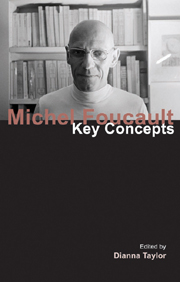6 - Freedom and bodies
from PART II - FREEDOM
Summary
The critical impact of Michel Foucault's philosophy is not based on the explicit theories or judgements he makes, but rather on the approach that he adopts to analysing our present. While science and much of philosophy aim to decipher from among the confusion of events and experiences that which is necessary and can be articulated as universal law, Foucault's thought moves in exactly the opposite direction. He attempts to find among the apparent necessities that which upon closer philosophical scrutiny turns out to be contingent, historical and culturally variable. Everything, especially those things that we are convinced do not have a history, is scrutinized.
This method is also utilized regarding Foucault's conception of the body. He does not present a theory of the body anywhere, or even a unified account of it, and his conception of it has to be discerned from his genealogical books and articles. Yet his philosophical approach to it is distinctive. The body is central for understanding the influence of history and the mechanisms of modern power. Its intertwinement with practices of power means that it has a central role in practices of resistance too: it is capable of displaying a dimension of freedom.
According to Foucault, we believe that the body obeys only the necessary and universal laws of physiology, and that history and culture have no influence on it. In reality, bodies are shaped by society: they are used and experienced in many different ways and their characteristics vary according to cultural practices.
- Type
- Chapter
- Information
- Michel FoucaultKey Concepts, pp. 85 - 98Publisher: Acumen PublishingPrint publication year: 2010
- 3
- Cited by

